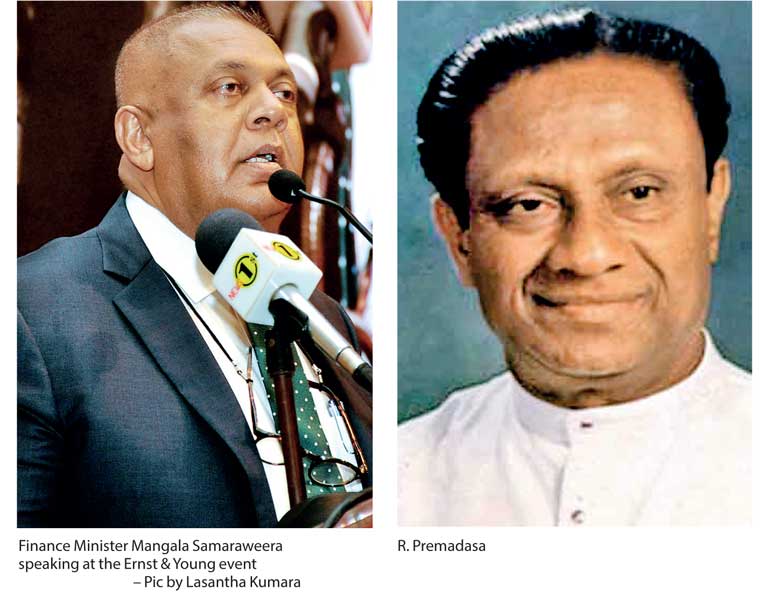Friday Feb 20, 2026
Friday Feb 20, 2026
Friday, 17 November 2017 00:00 - - {{hitsCtrl.values.hits}}
 Right of Reply
Right of ReplySpeaking at an event organised by Ernst & Young, Mangala Samaraweera has decried a “nanny state”, quite omitting to mention that the idea and phraseology is from Maggie Thatcher in the early 1980s and has been quite dated and discredited for some time. It is a caricature. Samaraweera followed up at the University of Colombo forum saying firmly that “free enterprise, liberalisation and globalisation” are “non-negotiable”.
Sarath de Alwis has attempted a shoddy, shabby hatchet job in his attempt to defend Mangala Samaraweera’s Budget which I regard as the most foolishly dangerous budget in our post- independence history.
First off, Sarath is intellectually dishonest in implying that I am opposed to globalisation. Nothing I have ever written or said can support that charge. In fact I repeatedly stated the opposite. What I did argue is that there are different models of globalisation of which the one which regards “free enterprise” and “fast-track liberalisation” as “non-negotiable”, i.e. the neoliberal model of globalisation which Mangala has opted for, is the least desirable or viable. In its place I have supported the Premadasa model and gone on to argue that another globalisation is possible; that there is an alternative model of globalisation—the China/East Asia model, in which the state has a guiding role and there is a strong state-private sector synergy.
Sarath has either missed or conveniently forgotten that the concept of a “Sri Lankan model of development”, which he finds ludicrous, is hardly of my minting, but that of Godfrey Gunatilleke whose brilliance was such that at age 25, with a First Class Honours in English and having topped his CCS batch, he was coopted by the sagacious DS Senanayake to the Prime Minister Secretariat. He soon grew to be internationally respected as a leading development thinker from the global South. “Towards a Sri Lankan Model of Development” is the theme and title of the Collection of Godfrey Gunatilleke’s writings 1975-2015.
De Alwis makes a number of snide remarks about President Premadasa, none of which have any bearing on his developmental achievement. Here too let me quote from Godfrey Gunatilleke’s volume:
“…when inequalities were widening under the liberalised market economy of the UN in the 1980s, President  Premadasa had to correct course with a large scale poverty alleviation programme…” (p 324)
Premadasa had to correct course with a large scale poverty alleviation programme…” (p 324)
“…later in the 1980s it was Premadasa, the UNP Prime Minister and later President who implemented a nationwide rural housing program, the resettlement of urban shanties and a poverty reduction strategy. The criticism of these programmes was that they were highly politicised, not subjected to the essential disciplines of project evaluation and did not achieve some of their main objectives. But underlying the programmes, there were powerful concepts that had a far-reaching impact on the future approaches to poverty reduction. The phrase President Premadasa used to describe the programme—nathi bari aya athi haki aya kirima—(to transform those who own nothing and are incapable to those who possess assets and have become capable) encapsulated Amartya Sen’s concept of capability in the Sri Lankan setting.” (p326)
De Alwis also makes some stroppy remarks about Philip Gunawardena and the Paddy Lands Act. Here again he misses the whole point, as we shall see when we read Godfrey:
“…these were the Employees Provident Fund and the Paddy Lands Act. Both were significant moves at providing social security and empowering under-privileged sections of the Sri Lankan society.” (p324)
Now onto Mangala’s Budget itself, which Sarath de Alwis stoutly defends. He makes the point that I am not an economist. True. We shall therefore have to rely on an economist—preferably one who did not work for Presidents Premadasa and/or Rajapaksa, as I did. Luckily we have the views of someone who fits the description, namely Dr. Sumanasiri Liyanage, who has recently pronounced thus on Mangala’s Budget in an article entitled ‘Budget 2018 and the Failure of Neoliberalism’:
“…What does it mean? It simply means reversing all the safeguards that had been implemented to protect small producers and workers. “Capital market reforms to capture its full potential are imperative for ensuring high growth” are, no doubt, aimed at the large resources accumulated in the Employers Provident Fund.
In this direction, the concrete actions proposed make it clear how the Budget 2018 would affect the lower rung of society not immediately but in the medium run and beyond. It would be catastrophic for them.
Let us read this section. “Much more has to be done. For example, the Rent Act, No 7 of 1972 which limits the ownership of houses and the rent to be charged requires amendments; Paddy Lands Act, No 1 of 1958 and the Agricultural Land Act, No. 42 of 1973 will be amended to allow the farming of alternate crops; the Shop and Office Employees Act, No 15 of 1954 will be amended allowing the employees flexibility in choosing their working hours; bankruptcy laws to be amended to make them more efficient.”
This list has clearly revealed one simple truth. The relatively progressive measures introduced by the previous governments partly because of the pressures at the grassroots level are now planned to be reversed…The ideology behind the budget may be summarised in two mantras: (1) “liberalise and globalise” (2) eliminate “non-tradable drivers”.
So in my opinion, the Budget 2018 entails the neoliberal ideology in its crudest form. It proposes to adopt all the prescriptions of the Washington Consensus to an extent that has never been applied before. The radical changes that have been proposed to change property rights would definitely ignite a process of what David Harvey called “the accumulation through dispossession”…
…Minister Samaraweera’s Budget 2018 is nothing more than an attempt to build a ‘consolidation state’ [Streak] through getting rid of all the legislation starting from the Education Act of 1939. Moreover, he has a set of proposals by the name of flexible factor markets directly aiming at land grabbing and facilitating labor exploitation. His boastful remarks on an increase in government revenue also indicates an attempt to pass the burden of debt state on the ordinary masses.” (https://www.colombotelegraph.com/index.php/budget-2018-the-failure-of-neoliberalism/)
My views as a non-economist seems in congruence with those of the trained economist Sumanasiri Liyanage. So I shall leave the reader with an option: Mangala and Sarath, or Godfrey and Sumanasiri? It is, I shall readily admit, an excruciatingly difficult intellectual choice, but one that we shall have to make, having agonised over it.
In the meanwhile, and speaking only for myself, if I woke up one morning and found that I much preferred Mangala Samaraweera’s ideas and policies to the contribution of Philip Gunawardena, Ranasinghe Premadasa, Mahinda Rajapaksa and Gotabaya Rajapaksa, to the extent that I trash the last four named and defend Mangala Samaraweera’s heartless Budget, I’d seriously worry about what had happened and what was happening to me.